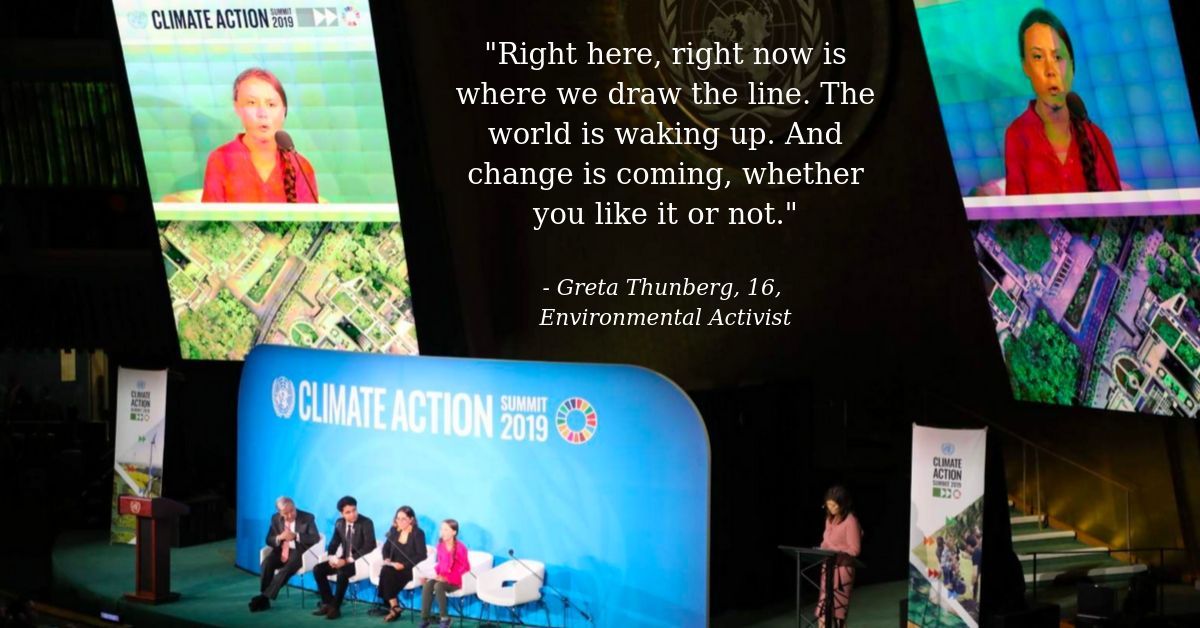
Greta Thunberg is a 16-year old environmental activist who advocates for climate change. In today’s U.N. Climate Action Summit she gave a rousing speech. The world is lucky she is in it. Testimony to a favorite quote by Margaret Mead:
By Suzanne Taylor

Greta Thunberg is a 16-year old environmental activist who advocates for climate change. In today’s U.N. Climate Action Summit she gave a rousing speech. The world is lucky she is in it. Testimony to a favorite quote by Margaret Mead:
By Suzanne Taylor
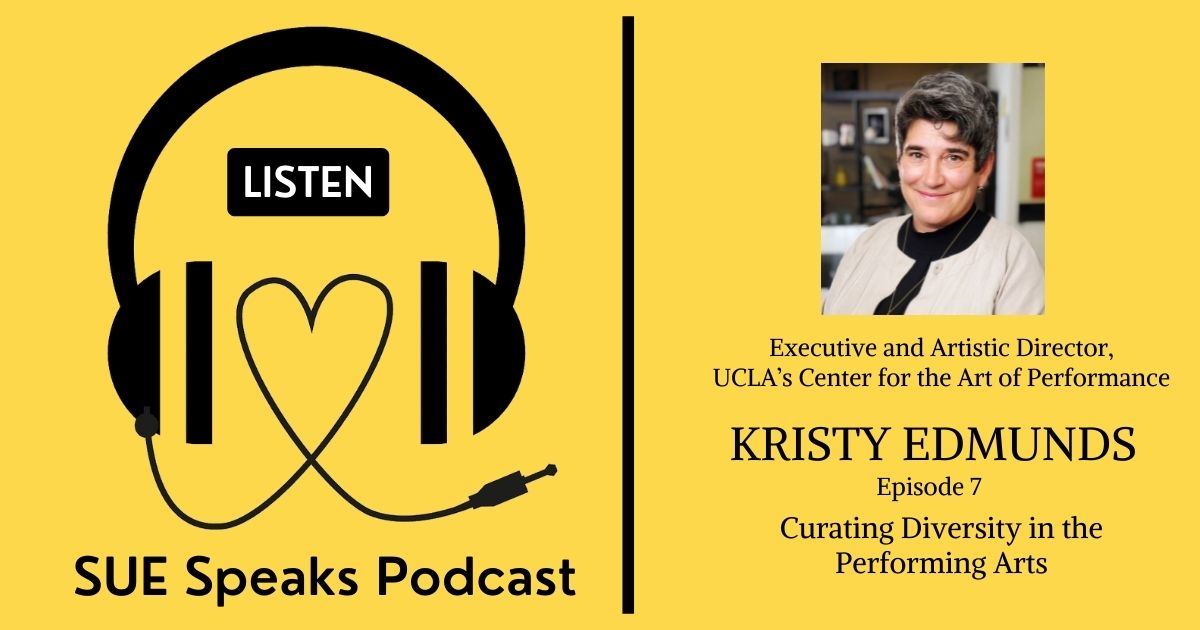
As an artist, curator, and artistic director, Kristy Edmunds has headed up theater organizations starting in Portland, Oregon, then Melbourne, Australia, and then at the Armory at New York City. All those programs, when Kristy left, had been revolutionized. One piece written about her is titled, HOW KRISTY EDMUNDS HAS SHAKEN UP CONTEMPORARY ART!
At UCLA since the 2012-13 season, she’s created seasons like none other in Los Angeles. Where our respected institutions present productions that mostly are tried and true, with commercial success in mind, the seasons offered by UCLA at The Center for the Art of Performance, or CAP, is an explosion of originality and creativity. Some presentations are by well-known artists in a range of categories from theater, to dance, to music, to spoken word, and some are the product of years of Kristy working with artists she discovers. As she says about what she presents, “Artists disrupt our conscious and unconscious tendency to feel complacent about any number of things going on in society writ large…the organization that I run has to work within the same spirit of acting from the position of integrity, compassion, and the usefulness of disruption.”
Being as much a creator of performances as she is someone who books them, as well as being the shepherd of a large flock of donors where the warmth of her engaging personality makes us all feel like we are her friend, she also is a marvel in the talks she delivers to audiences before many of the performances. She settles people in, letting them know the value of the arts in general and readying them for whatever they need to know about what they are about to see.
This spring she was named the inaugural recipient of the Berresford Prize, a $25,000 annual award, founded by United States Artists, to honor a cultural practitioner who has significantly contributed to the advancement, wellbeing and care of artists in society. Kristy got it “for her work as a thoughtful and groundbreaking cultural producer and advocate for artists.”
By Suzanne Taylor
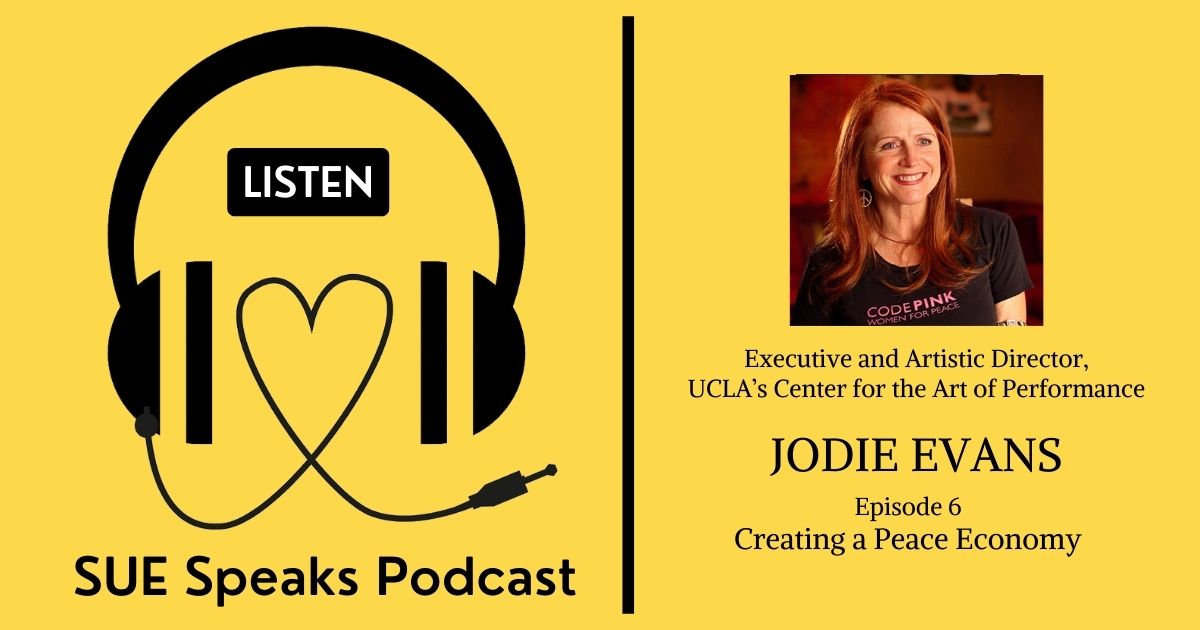
Seeing what a big world it is out there, I’d understand people being skeptical about my evaluation of Jodie Evans, but that wouldn’t shake my conviction that if she wanted to she could become the president of the U.S. If America knew her, I bet they’d elect her. She would be the one we have been waiting for, who would get us off our primitive commitment to making war.
Peace is her game and she has all categories covered. A political activist, author, and documentary film producer, comfortable from board rooms to war zones, she’s smart, historically astute, well-informed, beautiful, gracious, and kind. Best if all, she doesn’t want power. I met Jodie in the early ‘90s when she was Jerry Brown’s campaign manager and I hosted breakfasts for this maverick politician who early on was preaching environmental awareness and campaign finance reform. Some 40 years later, on leaving his second round as Governor, he appointed Jodie to the California Arts Commission that she helped him found during his first term from her advocacy for art as what ennobles the human being. She’s most publicly known as a founder of CODE Pink, a women-led grassroots organization working to end U.S. wars and militarism that was started in an effort to prevent the US invasion of Iraq.
To know Jodie is to love her. She has a warmth that doesn’t stop. You can see it. She shines. She gives herself to so many causes that it doesn’t seem like one person could do all that. However, when a philanthropy organization we both belong to gave her a 3-year term as its president, she did the kind of job you’d have thought was her only one. She is our mother hen, hatching a new society where we radically reimagine and transform our relationships so they are defined by love, by care and compassion and sacredness, by the qualities that nourish our souls and enrich our humanity.
By Suzanne Taylor
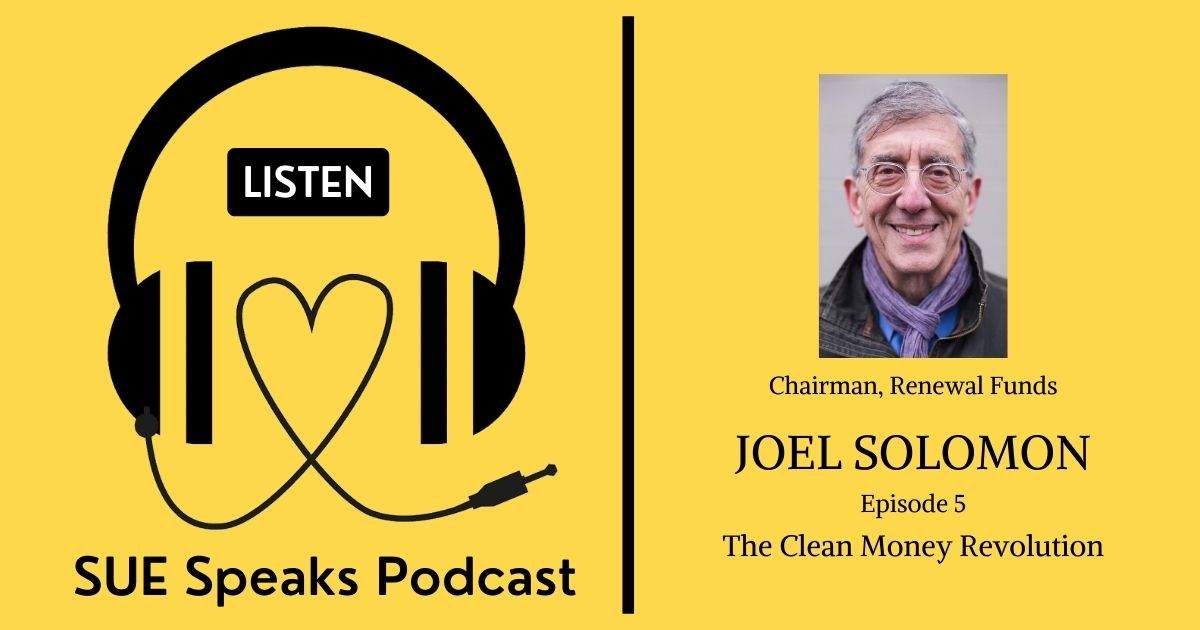
The next 20 years is a time in history when humanity’s future is up for grabs, and what could be pivotal is what Joel Solomon is advocating. It starts with people becoming conscious of how investment money is deployed. More of the same, where maximizing profit is the only consideration, and capitalism hits the wall of the greed that endangers us, where a wake-up to invest in what does good for humanity can give us a long-term future. He says we have the intelligence and capacity for that positive outcome, and, if the smartest people on the planet came together, they would figure it all out.
Joel is at the vanguard of The Clean Money Revolution, which involves a change of mindset to where doing good with money supersedes possessing it – better to be a billionaire of love so to speak than hoarding all that cash. That’s not Joel rejecting profit; his venture capital firm manages over $200M, but none of it is invested in what harms the world.
All of what Joel does comes out of who Joel is, which for me is a model for how to be. There’s a fundamental fairness button Joel has that’s inspirational. I hope he had enough of a platform in our podcast to have enrolled you in the Clean Money Revolution, where we’d go from an extractive economy to a generative one, not using money just to make money but investing money so that it becomes a force for good.
By Suzanne Taylor
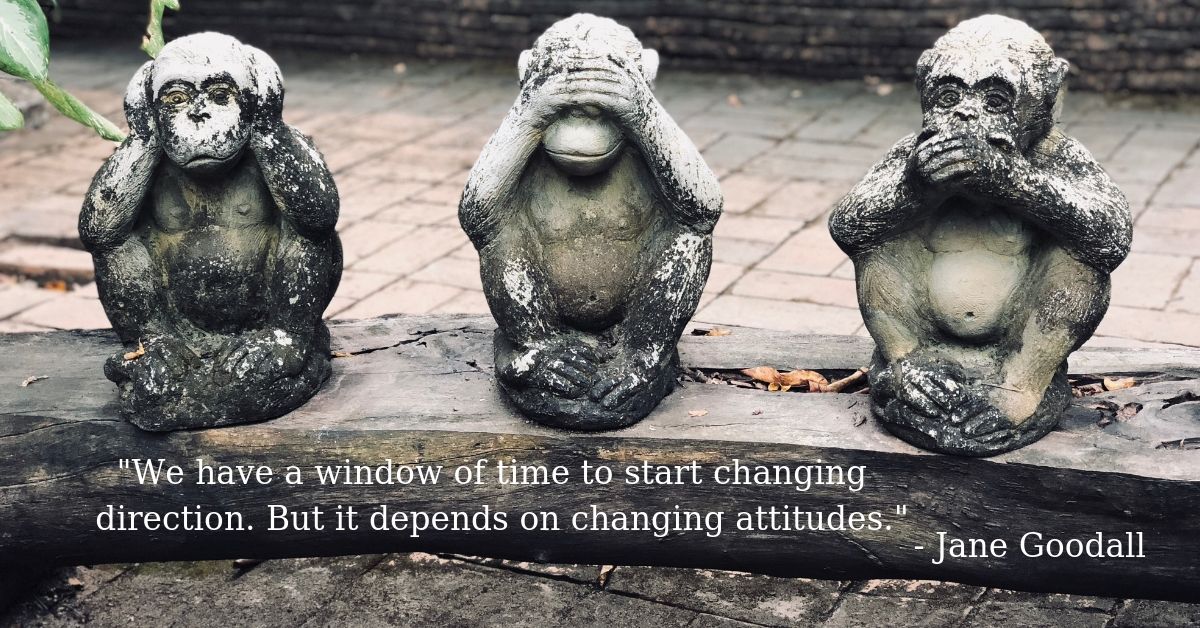
Jane Goodall does a star turn. She is so on it for our bottom line. When I listen to her I think that if everyone in the world were listening we’d change our ways.
My favorite quote for this moving video:
“It depends on changing attitudes. If we could just get a critical mass of us who start to think about the consequences…We just have to get it through to our thick heads that what we do as an individual certainly in the big scheme of things doesn’t make a difference, but what we do collectively as billions of human beings making the right ethical choices, that’s going to move us in the right direction.”
By Suzanne Taylor
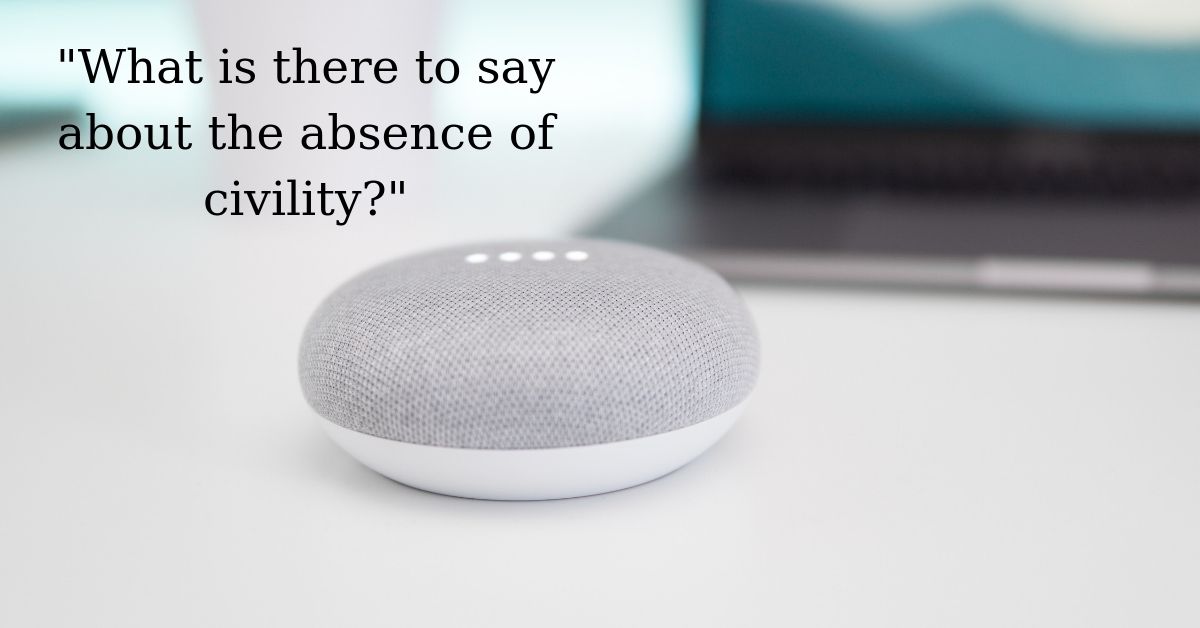
I feel funny issuing commands to my Google Assistant without my saying please and then my not saying thank you after it talks to me with a man’s voice as if it’s a person. What is there to say about this absence of civility? Is graciousness being programmed out of us in these meeting places where machines behave like humans and humans behave like machines? Is a mechanistic type of humanity what we are becoming?
I think we should be talking about this. It should be on our minds. We may want to deal with it. But, first, we have to realize there is something to be dealt with.
We no doubt can’t change what is reducing our humanity, but, to counter those things, we could be doing other things that add to our humanity.
One idea I have is about a connecting grid all across the world. Think of an app you can get on anytime you have 10 or 15 minutes to spare to randomly connect with someone somewhere who speaks your language. You’d have some prompts for what to talk about. This is a deck of talking topics I made that would invite meaningful sharing.
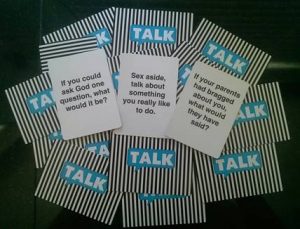
These engagements are just for that one connection – no ongoing pen pals or anything besides that little exchange. There would be a map of the world that gets another light wherever there’s a conversation.
Any other ideas out there?
Share and/or leave a comment
